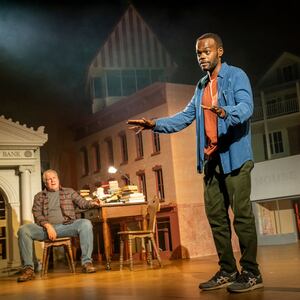The last Uncle Vanya to cause a stir in New York was far more modest in physical size than the Broadway production opening tonight at Lincoln Center Theater’s Vivian Beaumont Theater (to June 16), yet left a more emphatic impression. It took place in a Flatiron loft, with the audience seated in two rows running the length of the property’s living room, with its brilliant actors—including Bill Irwin, Marin Ireland, David Cromer, and Will Brill (now starring in the season’s deserved biggest hit, Stereophonic)—performing inches from audience members’ feet. As hearts broke, guns appeared, and so many feelings went unsaid, all felt viscerally immediate and clear.
The much-anticipated LCT production—the Hollywood star Steve Carell’s Broadway debut—is, first of all, such an odd duck to look at. The Beaumont stage is Lincoln Center’s biggest, but what fills it here? Not much, and not much logically and engagingly. A picnic table. Random tables, chairs (kind of looks mid-century modern). The actors are in modern dress, and drift and shimmy all over the expanse—the floor looks like the cross section of tree. They sometimes seem to get lost, and so—despite some standout performances—unfortunately do we.
This production of Vanya, directed by Lila Neugebauer, has been adapted by Heidi Schreck, the playwright and performer of the exquisite, and rightly acclaimed, What the Constitution Means to Me for which she received Tony nominations for Best Play and Best Actress (this season, Playbill reports, it’s America’s most produced play). Schreck told Playbill she is a “big Russian literature nerd” who first fell in love with Chekhov when performing in a production of Three Sisters while in college. She studied Russian, taught in Siberia, and worked as a journalist in St. Petersburg. She and her husband, director Kip Fagan, met while working on a production of The Seagull. “Chekhov’s been a very big part of my life for a long time,” Schreck told Playbill.
In this production, the crispness of Schreck’s words comes to be better suited to some characters over others. Its standout performers are William Jackson Harper, as the doctor Astrov, who Harper—award-nominated star of The Good Place and, for this critic, the best performer on or off Broadway last season in the excellent Primary Trust—imagines as both romantic and, when it comes to the other characters, analytic truth teller. Harper is a wonderful guide, narrator, and navigator of the text before him; one senses in the way that Schreck seeks to illuminate it too. Physically, he occupies the awkward stage space with the same wit and grace. You laugh with him, you welcome his pointed observations, and finally your heart breaks for him.

William Jackson Harper and Anika Noni Rose in 'Uncle Vanya.'
Marc J. FranklinYour heart follows similar leaps and falls for Alison Pill’s piercing portrayal of Sonia, futilely in love with Astrov, and touchingly, stubbornly committed to ensuring the continuance of the family farm with Vanya (Carell), despite the danger to their years of work by the person who owns it and now wants to sell it—her father Alexander (Alfred Molina), the professor brother of Vanya’s late wife.
Molina is quite simply not given enough to do; perhaps this is to accentuate the climactic dramas and laughs that pop off as final decisions about the future are made. But there is no sense, until it’s family fireworks time, of the relationship between Vanya and Alexander, the central knot of the play. There is a lot of ennui, and not much energy—despite the efforts of Harper and Pill. Similarly, Carell’s Vanya is passive to the point of recessive. It is a deliberately muted performance that is too quiet.
Our audience audibly perked up when Carell, thank goodness, got to exercise his comedy chops—and when he too lets loose towards the end. Anika Noni Rose as Elena, Alexander’s wife, desired by both Astrov and Vanya, is beautifully dressed, graceful, and arch, but perhaps too much of a puzzle wrapped in an enigma. What and who does she want? Does she feel trapped in her marriage, or calmly resigned? The wonderful Jayne Houdyshell deserves much more to say and do as Maria, Vanya’s mother, as does an underused Spencer Donovan Jones as a neighbor. Excellent comedic support is provided by Jonathan Hadary and Mia Katigbak.
But that crackling charge you hope from Uncle Vanya—the sense of a hot summer and the alternately comic and tragic cauldron a family adrift and questioning and interrogating themselves individually and as a unit—feels unmet here. Neugebauer’s loose direction—so different from the sharp and precisely realized Appropriate—doesn’t give the characters space to breathe, but instead an unintended void in which to lose themselves, and our attention.







